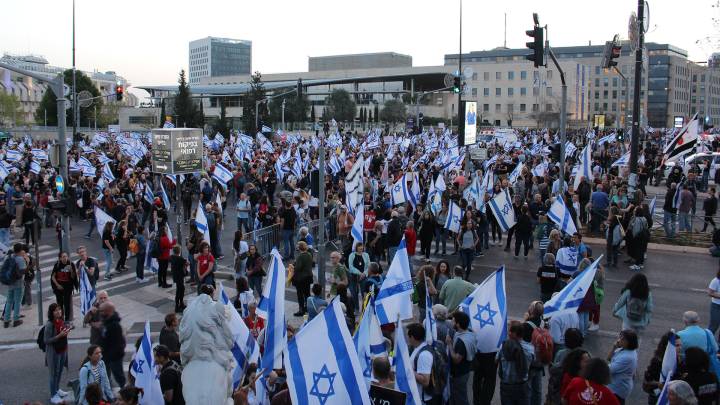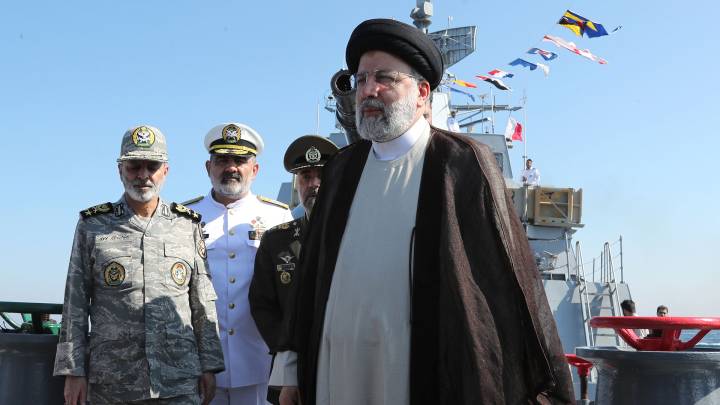The re-emergence of a prolonged Middle Eastern crisis draws attention to the consequences and long-term effects taking up shape in the wake of the Gaza war. Is Washington able to adjust?
The emergence of today’s crisis, in a different form and pattern from earlier conflicts in the region, is neither new nor surprising. It is notable, however, that the focal point of the wider discussion has shifted, to the extent that the Palestinian issue has been marginalised, while regional and international geopolitical interests have been amplified, in a historical echo of the Cold War division of the global establishment into “East” and West.
Such developments may represent the impact of two important regional developments: the Syrian crisis in 2011 vis-à-vis ‘the way [it] has repositioned the central focus back to the Middle East [which] has revived Cold War alliances’; and the legacy of the Iraq war (2003), when the fall of Saddam Hussein changed the balance of power inside Iraq. The politics of and reactions to today’s crisis appear, thus, to stem from the post-2003 developments, especially after the US attempts to withdraw from Iraq in 2011, and the effects of a prolonged period of upheaval that heightened from 2011 onwards the formation of solid Western versus anti-Western blocs.
This attempt to impose a new world order appears to be based mainly on ideational divisions and different perceptions of the asymmetry in the nature of regional alliances as well as the range of actors (state or non-state) involved in supporting these different camps. This very separation of the international realm into two camps can be traced today in the re-emergence of the Palestinian rivalry with the Israelis, a conflict with long-term impacts that bring new realities in the analysis.
The current discourse in relation to the conflict in Gaza seems to follow the same pattern which transforms a prolonged political crisis into one focused on the war on terror
Twenty years since the war in Iraq (2003), a new era is beginning to unfold today with the restructuring of power and changing patterns of relationships based on these two groupings. The anti-Western bloc is already being characterized by flexibility in its deterrence policy and blurring the picture by involving all possible players. Indeed, such ability allows it to forge alliances and rely on both state and non-state actors as equal partners, rather than instrumentalising them as mere proxies, which, in turn, seems to question the very notion of proxy.
Regionally, Iran continues to emerge victorious from the escalation of any severe conflict that threatens the regional status quo and its stability, such as the current one, because it is permitted to protect its territorial sovereignty while wars are conducted outside its borders and directing the attention of the international community away from its domestic problems, including the nuclear file. Such past tactics were intensified particularly with the rise of the so-called Islamic State back in 2014.
On the international level, the current conflict, and its potential repercussions, highlight the vulnerabilities of American foreign policy in the region. US foreign policy’s realisation in the 21st century that a regional balance of power could be achieved only through democratic state-building, which, consequently, was regarded as the essential condition for regional stability, appears now in sharp contrast to the unresolved crisis that has been a live issue for more than half century. Dualism in the US foreign policy practice and discourse can be seen in the 2005 speech in Cairo by Secretary of State, Condoleezza Rice: “The Palestinian Authority will soon take control of the Gaza–a first step toward realizing the vision of two democratic states living side by side in peace and security … the Israelis fulfil their obligations and responsibilities to help create a viable Palestinian state, the entire world–especially Egypt and the United States–will offer full support” (‘Remarks at the American University in Cairo’, US Department of State).
Such inconsistencies can be also related to the initial linkages of the US democratisation project to “help Middle Eastern states to overcome the ideology of violent Islamist extremism” per se as this was portrayed by George W. Bush’s administration. In this context, the current discourse in relation to the conflict in Gaza seems to follow the same pattern which transforms a prolonged political crisis into one focused on the war on terror. Such reductionist practices hamper the resolution of the Middle East issue.
US foreign policy’s reformation appears more imperative if there are signs of the US playing the role of the observer
Although US national interest has long been based on both safeguarding Israeli security and confronting religious radicalism and terrorist acts (cf. the formation of the ‘Cabinet Committee to Combat Terrorism’ and ‘the Working Group on Terrorism’, 25 September 1972), continuing to overemphasise them harm the broader spectrum of objectives that the US national interest entails.
Finally, the US foreign policy’s inability to maintain influence in the region whilst avoiding direct involvement in the war-scene following Barack Obama’s reset policy left the US in limbo and ostensibly pulling in different directions: despite Obama’s calls for a new beginning between Muslims and the United States (Cairo speech, June 4, 2009), for instance, he opposed the Palestinian Authority’s bid for statehood through the National Security Council. Internal disagreements in a fragmented post-Trump administration and matters of US national priorities as well as the (future) status of American global leadership make it difficult to determine the extent to which the US acts with a view to the continuation of its dominant role in the region.
In this context, the lack of both concrete policies and a coherent, long-term strategic vision of how to further US interests as a global power appear to have damaged successive administrations’ images, while, at the same time, weakening Middle Eastern states because neither targeted action nor a firm commitment to a clear long-term vision appears to have been implemented. Given the fact that George W. Bush’s foreign policy agenda was shaped by a bipartisan neo-conservative team, whose interests have raised questions regarding their policies’ alignment with Washington’s interests, as well as that Obama’s presidency lacked a clear orientation, directions of US foreign policy toward the Middle East remain ambiguous in their recent genesis.
Alongside questions pertaining to Hamas’s actions and the role of the international institutions, is the need to consider any re-positioning of American foreign policy in the region by asking what Washington’s interests is. US foreign policy’s reformation appears more imperative if there are signs of the US playing the role of the observer rather than reclaiming a more dynamic and responsible stance as a peacemaker and balancer in a region. Especially when rhetoric focused on the rights of nations to defend their borders and territories chimes with sentiments expressed and actioned in Russian foreign policy and is, quite surprisingly, supported also by Chinese foreign policy.
Marianna Charountaki is Senior Lecturer in International Politics at the University of Lincoln at the School of Social and Political Sciences.




